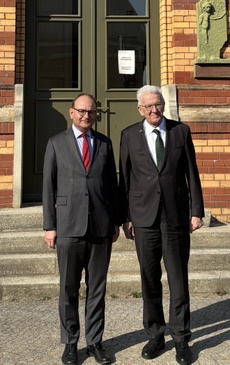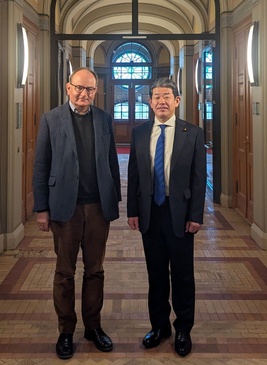

On 21 March, PIK welcomed Winfried Kretschmann, Minister-President of Baden-Württemberg, where researchers Gunnar Luderer and Michael Pahle presented scenarios and strategies for a cost-effective transition to climate neutrality, and discussed the role of the EU Emissions Trading System (ETS). Bilateral discussions with Ottmar Edenhofer then focused on topics such as carbon pricing, alleviating the burden on lower-income households, and effective arguments to counter climate change denial.
A few days later, on 24 March, Edenhofer welcomed the Chilean Environment Minister Maisa Rojas, who is also a climate scientist and contributor to the IPCC’s Sixth Assessment Report. Minister Rojas was accompanied by Chile’s Ambassador to Germany, Magdalena Atria, and other Chilean officials. The visitors were briefed on the latest developments in PIK’s climate impact research followed by an in-depth conversation about Chile’s ambitious climate goals, renewable energy expansion and the current state of climate research. Chile has committed to reducing its carbon emissions by 30 percent by 2030. Ambassador Atria had previously visited PIK in January for discussions with Edenhofer and hydrologist Fred Hattermann.

Finally, on 26 March, Kiyoshi Igarashi, Japan’s Parliamentary Vice-Minister for the Environment, visited PIK along with representatives from Japan’s Ministry of the Environment and the Japanese Embassy. The conversation with Edenhofer focused on possible cooperation between Japan, China, India and Germany on climate protection, as well as the potential impacts of the EU’s Carbon Border Adjustment Mechanism (CBAM) on Asian economies. The CBAM aims to meet climate goals while preventing the relocation of industries to countries with more lenient climate policies. Introduced in 2023, it will be gradually phased in from 2026.
For further information please contact:
PIK press office
Phone: +49 331 288 25 07
E-Mail: press@pik-potsdam.de
www.pik-potsdam.de





